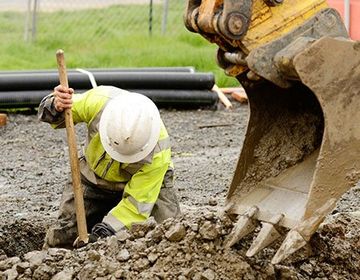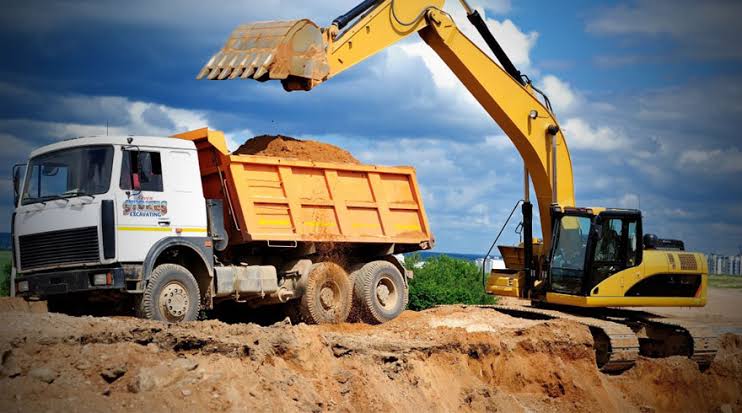Residential Excavating Ohio - Specialized Excavation for Ohio Residences
Residential Excavating Ohio - Specialized Excavation for Ohio Residences
Blog Article
Revealing the Art of Excavation: Pro Tips for Safe and Efficient Digging
As dirt is turned and planet is relocated, the complexities of excavation reveal themselves, demanding an eager understanding of devices, dirt composition, safety and security protocols, and ecological factors to consider. The proficiency required to browse these aspects properly can imply the distinction between an effective excavation task and a prospective disaster.
Significance of Correct Equipment
To make sure the safety and effectiveness of any kind of excavation project, using the ideal equipment is vital. The right devices not just enhance efficiency yet also minimize risks related to excavating. Excavation tasks vary in extent and complexity, ranging from tiny property landscaping tasks to large building undertakings. No matter the task size, having the proper tools can make a considerable distinction in the outcome.
Excavators are fundamental pieces of machinery in any type of excavating operation. These flexible equipments been available in various dimensions to suit different job needs. Tiny excavators are excellent for smaller sized tasks, while larger excavators take on a lot more extensive projects efficiently. Backhoes are another essential tools type, combining the functions of a loader and an excavator in one maker. They are important for tasks calling for convenience and ability to move.
Aside from excavators, other important devices consists of dump vehicles, trenchers, and bulldozers. Discard trucks are important for getting rid of and transferring excavated materials, while trenchers are used for excavating deep and narrow trenches. Excavators stand out in jobs that require pressing large amounts of dirt or particles. By investing in the suitable equipment, excavation jobs can be finished securely, on time, and with accuracy.
Recognizing Soil Composition
An extensive grasp of soil structure is essential for implementing excavation tasks with precision and safety and security. Understanding the various kinds of soil is vital as it straight affects excavation techniques, devices choice, and total task performance.
Sand fragments are the biggest and give great drain however provide little cohesion. Silt particles are smaller sized than sand yet bigger than clay, supplying modest drain and cohesion. Clay fragments are the tiniest and supply high cohesion but inadequate drain. Raw material, such as decaying plant product, affects dirt fertility and stability.
Prior to commencing excavation, performing dirt examinations to establish its structure and attributes is essential. This details assists in selecting the ideal devices, implementing safety and security steps, and developing excavation methods tailored to the details soil conditions - lancaster excavation. By comprehending soil make-up, excavation experts can boost job end results while making sure safety and adherence to finest techniques
Precaution and Procedures
Understanding soil make-up is the foundation whereupon security actions and protocols for excavation jobs are built, making sure the well-being of workers and the success of the undertaking. There are numerous essential actions that must be executed to alleviate threats and prevent mishaps. when it comes to security throughout excavation.
Primarily, before any digging begins, a complete evaluation of the site must be carried out to recognize any kind of possible threats such as underground utilities, unstable soil conditions, or close-by frameworks that can posture a threat. It is crucial to have a proficient person manage you can try this out the excavation procedure to make certain that all safety protocols are followed purely.
Moreover, all employees involved in the excavation has to be appropriately educated in secure digging practices and the correct operation of devices. By sticking to these safety and security actions and protocols, excavation projects can be completed effectively and without event.
Efficient Excavation Planning
When beginning on an excavation job, meticulous planning is important to make certain effectiveness, safety, and successful end results. Efficient excavation preparation involves a number of key actions that are crucial for the smooth execution of the job.
As soon as the site evaluation is full, the next action is to develop a clear timeline and schedule for the excavation tasks. This consists of identifying the series of jobs, equipment demands, and workforce allocation. Proper scheduling aids avoid hold-ups and guarantees that the job remains on track.

Furthermore, communication among all employee is vital during the planning phase. Clear instructions, normal updates, and reliable coordination are important for a successful excavation job. By spending time and effort in meticulous read this post here planning, excavation groups can dramatically improve efficiency, minimize risks, and attain effective outcomes.

Managing Environmental Factors To Consider
With increasing focus on environmental sustainability in construction methods, managing ecological factors to consider has come to be an important facet of excavation projects. Excavation tasks have the prospective to affect the surrounding environment with soil erosion, debris overflow, environment interruption, and contamination of water resources. To reduce these threats, it is site important to execute ideal methods that focus on ecological security.

In addition, correct waste monitoring is crucial to stop soil and water contamination. Implementing procedures for the disposal of hazardous products, recycling of waste products, and minimizing making use of dangerous chemicals can substantially minimize the environmental impact of excavation projects. By incorporating these techniques right into excavation planning and execution, construction firms can make certain that their jobs are not only secure and efficient however additionally ecologically responsible.
Final Thought
In final thought, grasping the art of excavation requires a detailed understanding of proper tools, soil structure, safety measures, and efficient planning. By following these standards and considering ecological variables, excavations can be performed safely and effectively. It is critical to focus on safety and productivity in every excavating project to guarantee successful end results.
As soil is transformed and earth is relocated, the details of excavation expose themselves, requiring an eager understanding of equipment, dirt composition, safety procedures, and ecological factors to consider.To make sure the safety and security and effectiveness of any excavation job, making use of the suitable tools is critical.A thorough grasp of dirt make-up is essential for implementing excavation projects with accuracy and safety and security. Understanding the various kinds of soil is vital as it straight impacts excavation techniques, tools selection, and general job performance. By understanding dirt make-up, excavation professionals can improve task end results while guaranteeing security and adherence to ideal techniques.
Report this page